QuestionQUESTION: Hi. My 13 year old lab mix pants heavily, but only at night. She is fine during the day...sleeps, eats, hangs out. But, every night she pants and paces for hours until falling asleep around 3am. She was diagnosed with a mild case of laryngeal paralysis a few weeks ago. She is on a bronchadialtor (theophylline) twice a day. She is also on benadryl twice a day incase it might be allergies. She has moderate arthritis, and is on 150mg of tramadol twice a day, 75mg of rimadyl twice a day, fish oil pills, glucosomine, and levothyroxine for hypothyroidism all twice a day.
She has a doctor's appt on Tuesday for them to test for Cushing's Disease. I requested this test, since she has many of the symptoms.
Do you have any idea why she is totally fine all day long, and then does this for hours every night? I thought she might not like the dark, so I turned every light on in the house...she is still panting and pacing like crazy.
Please let me know any ideas you have. She had an x-ray 2 weeks ago on her throat and chest. The doctor said her heart and lungs looked fine - no masses.
I hope she is not in pain. It's just so weird that it only happens at night. When she sits outside it seems to get a little better, but the second she steps back inside, the panting and pacing start all over.
Please help!!
Heidi
ANSWER: Theophylline can cause restlessness, the "jitters", insomnia (an extremely common side effect as reported in a present study of the medication in humans), and rarely (less than 8% in humans) hyperventilation and heart rhythm disturbance. Benadryl also has mild bronchodilatory effects: perhaps the dog is being over medicated. Benadryl can have extremely pronounced effects on dog behavior, I've seen it a hundred times. With no proven allergic reaction, it's not something i would give my dog. Additionally, human reports of the side effects of Tramadol include tremors, anxiety, agitation, hallucinations and, in less than 8%, confusion, sleep disorders and coordination disturbance. Rimadyl has been indicated as a cause of serious health disorders in dogs, found at this site:
http://www.srdogs.com/Pages/rimadylfr.html
It seems logical to assume that her medications are creating this problem; heart enlargement seems to have been ruled out by x-ray. I notice you've asked questions regarding this dog's health of a veterinarian on this site. I expect you don't have much confidence in your veterinarian, perhaps for good reason, or perhaps because you're extremely anxious because the dog is much loved and coming to the end of her life. My suggestion (if it were me): find a teaching veterinary facility within a reasonable driving distance (three hours) and make an appointment. Have all test results faxed over before going to the appointment. Ask to see a veterinarian with a significant knowledge base in medications, it seems to me your dog is on an awful lot of serious meds. I'd opt to get her off the Rimadyl considering the problems the drug has caused (as you'll see from that site). Worst case scenario, her arthritis bothers her; best case, she feels better. This medication isn't a life saving necessity.
Get this second opinion; if your veterinarian doesn't like it, too bad (and there's no reason s/he should object). If you can't get to the teaching facility itself, ask for referral to the best veterinary hospital within that reasonable driving distance.
---------- FOLLOW-UP ----------
QUESTION: Thank you so much for your answer, Dr. Connor. Yes, you are right...I love this little girl more than anything in this world and I am trying any avenue I can to help her. We have been to multiple docs and everyone seems to think this is the medicine for her. But, I always ask...Are we overmedicating her? So, thank you for bringing that up.
Since allergy season is almost over, we will stop the benadryl and theophylline this week. I'm so glad about that! But...she was doing the panting and pacing way before we started those drugs (she's only been on them just during allergy season for about 6 to 7 weeks).
She was put on Tramadol about two years ago. The docs think her arthritis pain is pretty significant, so that's why they wanted tramadol and rimadyl (they said the two drugs together work better than if given one or the other only).
My follow-up question to you is, if we are dosing her the same exact amount (same pills and same dosages) in the morning AND at night, why would she ONLY pant and pace at night? It truly is like jekyll and hyde...she is a completely different dog during the morning and all day until about an hour after it gets dark. I could understand the overmedication theory if we were just giving meds at night, or perhaps giving a much higher dose at night. But, do you have any theories on why the panting and pacing would happen just after it's dark? It lasts for an hour to several hours, then she falls asleep and when she wakes up in the morning, she's her normal self again.
Does this sound like Cushing's Disease? She is being tested for that on Tuesday. But, would Cushings only cause panting and pacing at night?
I have heard the discussions about Rimadyl and had mixed feelings about her being on it. But...she has been on it for 5 years and the doctors told us that if her bloodwork has come back fine for the last 5 years, she is safe. Plus, being a 13 year old lab mix, they felt the benefits of Rimadyl outweighed the risks. Could Rimadyl just all-of-a-sudden start causing problems after all these years?
Please let me know any follow-up thoughts you have. Thanks for your expertise and kindness.
Heidi
ANSWER: Cushing's syndrome can be caused by steroid drugs; your dog is on a lot of them. Cushing's disease is caused by pituitary or adrenal tumors. The symptoms can be increased appetite, increased drinking and urination, panting, high blood pressure, bulging abdomen, skin lumps and discoloring, hair loss, muscle weakness, and nervous system disorders. During its initial stages this disease mimics the normal problems of aging dogs but at later stages dogs with this disease have enlarged abdomens and suffer from hair loss. It's not likely the dog would pant only at night. It's possible that the full chemical load of a day's worth of medications (some of which appear to be treating the same thing) might produce symptoms at night that aren't seen during the day but this could be strictly behavioral. I can't SEE if your dog has Cushing's syndrome and I'm not a veterinarian. You just can't take a dog OFF medication without running this past a veterinarian. Whether or not Rimadyl could suddenly begin causing problems isn't something I can offer an opinion on; I know humans can, and do, develop sudden problems with medications they've been having for years so I imagine the same thing holds true for any living being. As I suggested earlier, you need to seek another, very expert veterinary opinion in person.
If this is behavioral, you are most likely (and have been) rewarding it by giving the dog attention. If you appear anxious at the first sign of anxiety in a dog, the dog will immediately acquire validation for its fear. The more you attempt to console the dog, the more you are rewarding and validating the fear. Over time, this sort of interaction begins to become associated by the dog with cues: light or dark, certain sounds or movements indoors or outdoors, the presence of certain people or other animals in the household, etc. It can then progress to a chronic state where the dog picks up cues BEFORE and AFTER the original point of onset. I don't know how you've interacted with this dog under circumstances where she's shown fear but I do know this: You are far too anxious and fearful regarding this dog's health. This isn't good for either of you. I fully understand the close attachment of a loving owner toward a dog or any other companion; these companions are like children or very close friends. The idea of approaching separation due to death is horrifying; if you have any incident in your past (especially childhood) that hasn't been appropriately resolved, the prospect of losing such a close companion can be terrifying and panicking. I suffered enormously at the death of my much beloved Doberman, Rosebud, as a young woman; I went into counseling because I knew my suffering was far deeper than the immediate circumstance and came to terms with the death of a parent that had occurred when I was a child. Only you know if you have such a circumstance, or other circumstance of loss or abandonment, in your past that may be crying out for attention.
Meanwhile, do not coddle this dog or hover around her fearfully when she's experiencing these episodes. Leash restraint is far more than physical control to a dog that's well habituated to it, it's also a psychological control. Put the dog on leash, bring her to a soft bed (even next to your own) and tell her to "lie down". Don't pet her, don't hover over her, don't give her any more attention than is needed to get her to remain in that spot. See if this restraint helps to calm her. If you stop reinforcing her fear (if this is indeed what's causing the problem), her fear will diminish and possibly self extinguish. If this is a physical problem, the restraint and proximity to you will also help to calm her. Adding any anti-anxiety medication to the load of chemicals she's already ingesting doesn't seem like a good idea to me. However, another veterinary opinion might determine physical cause or offer this medication until the dog is calmer, if there's no physical cause.
---------- FOLLOW-UP ----------
QUESTION: Dr. Connor,
You are truly amazing! You picked up on a very important issue with me immediately. The love I have for my dog goes very deep in my heart...deeper than anyone could imagine. My mom died unexpectedly when I was 22, a senior in college. She was my best friend in the whole world and we were so close. Weeks after her death, I got my sweet dog. She was a 10 week old puppy that I rescued from the humane society just HOURS before they were going to euthanize her. She became my rock and my strength throughout the toughest time in my life. I have a wonderful, amazing dad and great friends, but no one was more important to me than my dog after my mom died because she was there for me day and night.
A year and a half later, I got another rescue dog. My two dogs became best friends and both of them helped me heal more and more everday from the loss of my mom. I became unbelievably attached to them both, and they were the center of my world.
After college graduation, I met an amazing guy and married him. He was as much of an animal lover as I am. We ended up getting one more rescue dog and two rescue cats. We were a happy family!!
My husband and I were married for 3 years before we tried to have a baby. Months went on...no luck. I went through fertility treatments and we finally got pregnant. But, I lost the baby soon into the pregnancy. It was devestating. But, at least I had my beautiful, healthy animals to get me through. We tried for 4 more years with every kind of fetility treatment out there. Spent $50,000 dollars of our own money, since insurance doesn't cover fertility. Finally, in January 2008, we did IVF and got pregnant with twins. I ended up miscarrying both of them shortly into the pregnancy ('Baby A' in February and 'Baby B' in March). But, again, all this time throughout the pain of infertility, my dogs and cats were there for me, always so comforting. Weeks after I lost the twins, the most devestating thing in the world happened...April 2008, our 10 year old dog (who grew up with the one we've been talking about) suddenly developed a hemangiosarcoma tumor...we took her in to the vet one day because she didn't look like she felt good, and after an x-rays, they found the tumor. It was as if it came up over night. We immediately rushed her to the specialist 3 hours away, and they did surgery. 4 days later, she died from complications from ths tumor. I went into a complete depression. I didn't want to eat, leave the house, or talk to anyone. The ONLY thing that made me want to go on was knowing my other dogs and cats (and husband) needed me.
Fast forward to 6 months later (Oct 08). We did IVF again and finally I was pregnant with a boy...heartbeat was great...never had I made it this far in a pregnancy. So, we had hope again. But unfortunately, his heart stopped in utero one day and he did not make it.
Through EVERYTHING I have been through, my animals have been the constant, loving forces in my life. My husband, father and friends are great, but my animals are who I have always turned to in times of need. They have always been there, through thick and thin...they never say the wrong thing and they just sit with me when I need comforting. That's more than you can say for most people.
So, you hit the nail on the head when you said that maybe there was some unresolved issues in my life. I have lost my mom, my precious dog and 4 babies. I am not willing to lose my oldest dog. I feel that if I ask enough people and take her to enough specialists that I can save her. In reality, yes she is old. 13 years old is up there in age for a large dog. It's been the hardest thing to watch this puppy from 13 years ago grow old and have problems. Most days I can't bear to think about it.
Thank you so much for bringing this up and letting me talk about it, and for your advice. I have definitely been overly coddling to her when she is up panting and pacing. I try any and everything to help calm her when she gets like that. She knows this. I will try a leash tonight, and bring her bed right next to ours, and maybe close the door to the bedroom so she can't go far. It's just REALLY hard to sleep when she is panting and pacing...she always comes to get either my husband or I out of bed by nudging us until we get up. It's very loud and she makes it known that she needs help. No one can sleep when she is like this. So, naturally we try anything to help her so we can ALL get some sleep!
Thank you again. Your words were just what I needed to hear today.
Heidi
AnswerI can't resist throwing in two more cents after reading that heart rending message.
I know exactly how difficult it is to lose a child, having had a miscarriage myself; in my case, I was extremely fortunate to have had a baby at a time in life when I pretty much thought I'd never have any, but that doesn't take the pain out of losing a child through miscarriage: when you're pregnant, you're supposed to end up with a baby, not a nightmare. We don't understand the vagaries of life, the joys and horrors, the rewards and loss; many people end up blaming their concept of "God", some blame themselves (for a lifetime), but all who lose a loved one, human or otherwise, suffer. You've been through a great deal and you are now coming to terms with the inevitable. I strongly suggest you find a grief counselor. There are many really awful people doing human therapy, but there are many truly gifted ones, also. This counseling will help you come to terms with all of your losses and will help you to deal with the sickness of your dog without panic and fear. Each loss we suffer brings back ALL of them; it's like a huge ball of yarn racing downhill, getting bigger and bigger, until it self destructs. You have had suffering and loss but you have also had love and support; now, you need to love yourself and get help.
The dog, meanwhile, has been rewarded for her panting behavior which is most likely NOT caused by physical problems. She's so well "trained" in this behavior that she deliberately wakens you. For her sake and your own, you need to restrain her on leash or close the bedroom door and you need to IGNORE the nudging. Get ear plugs so sounds won't waken you; for a few nights in a row, totally ignore the nudging. Keep this up until she gives up and goes to sleep; this might take longer in the beginning but after a few nights it should work. Give it a try. Thanks for sharing with me.

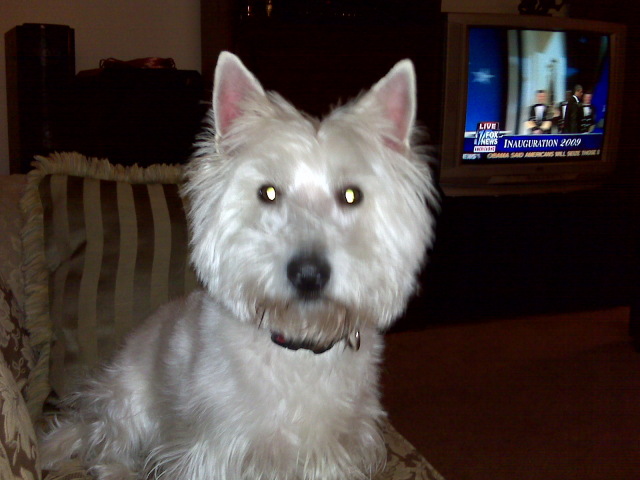 Companion for Lonley Westie
Question
Shannon
We have a 5-year-old neutered Westie w
Companion for Lonley Westie
Question
Shannon
We have a 5-year-old neutered Westie w
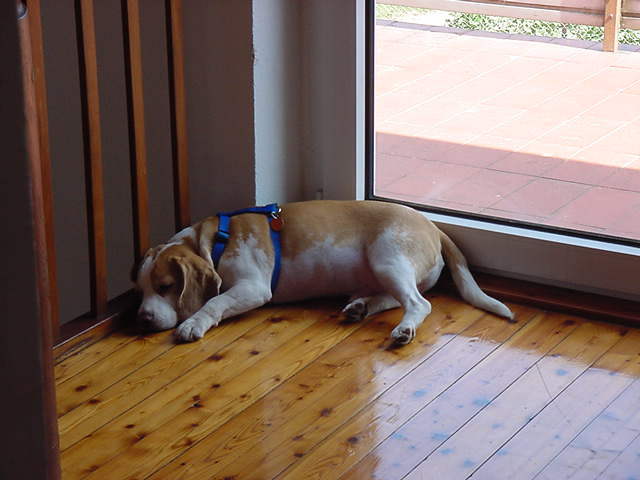 licking the floor not stop
QuestionGeorgie
QUESTION: Hi,
I have a 7 year ol
licking the floor not stop
QuestionGeorgie
QUESTION: Hi,
I have a 7 year ol
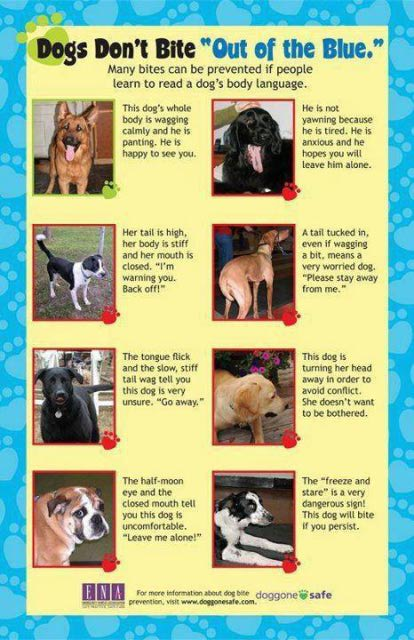 Is this aggression, dominance, or play?
QuestionQUESTION: I have a question regarding doggy beh
Is this aggression, dominance, or play?
QuestionQUESTION: I have a question regarding doggy beh
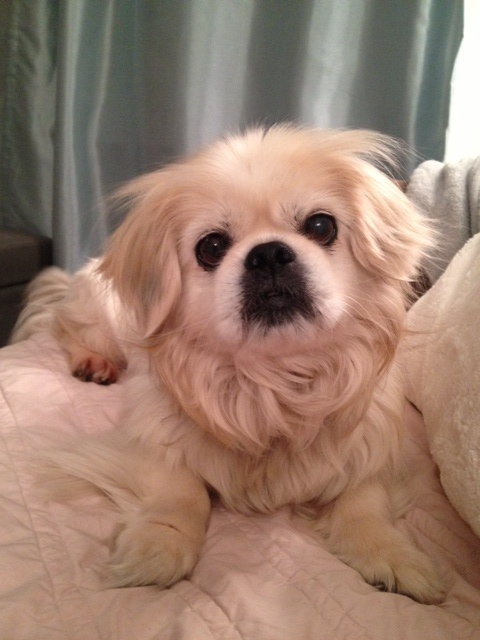 Nightmares?
Question
Beethoven
Hi Melissa, Ive had my very h
Nightmares?
Question
Beethoven
Hi Melissa, Ive had my very h
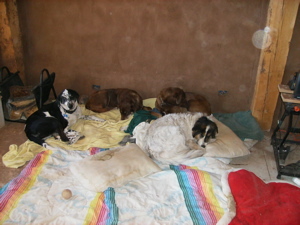 Sudden aggression within pack after a death
Question
Sudden aggression in o
We have an approximatel
Sudden aggression within pack after a death
Question
Sudden aggression in o
We have an approximatel